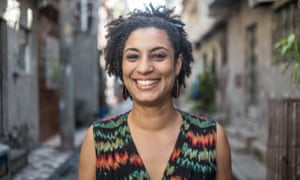"Marielle Presente" (Marielle Is Here)
"Her bloodshed can't be used as an opportune moment to talk about hate."
"When you talk about a black-white divide, you are contributing to this division."
Ana Amelia, white Brazilian, Rio de Janeiro state senator
"A black woman was speaking out and calling for rights, and she was killed because she could be."
"It is time to speak out. It is time to talk about race, because we are the ones suffering."
Rubia Augusta Gomes, 38, Afro-Brazilian dancer
 |
| Marielle Franco -- fearless, charismatic and popular. Photograph: Mídia Ninja |
Brazil takes pride in its belief that it is not a racist society, but rather a post-racial culture. The existing deep- rooted societal and cultural discrimination and violence is not a topic for polite conversation. Nor is the fact that it is denied. The national identity was forged through miscegenation, with 53 percent of the population of Brazil viewing themselves as either black or of mixed-race. And they tend to represent those living in poverty, discriminated against, with far fewer opportunities than their white counterparts.
![Marielle Franco may be gone, but she is not silenced Demonstrators participate in a protest against the murder of Rio de Janeiro City Councilor Marielle Franco. The sign reads: 'Marielle, we will be your voice everywhere' [Jose Cabezas/Reuters]](https://www.aljazeera.com/mritems/imagecache/mbdxxlarge/mritems/Images/2018/3/21/78b79de5f6154ed098ed77e426bbe8c4_18.jpg)
She left that meeting and as she approached her awaiting white Chevy, according to an aide in her car, two vehicles converged and gunfire rang out. Accustomed as she was to the reality of death stalking her people, she was not anticipating she was next in line. Her body absorbed nine bullets, four to the head, killing her. As Latin America's largest nation and one seen as the most influential in the region, this black activist, a lesbian with full-throated accusations, labelled her country a global symbol of racial persecution and oppression.
| Protesters hold a banner that reads "Marielle lives" in Rio de Janeiro on Tuesday |
Her death by authorized assassination has empowered her Rio base to march in her name and demand justice. Crowds protesting her violent death assembled on the streets of New York, London, Paris, Munich Stockholm and Lisbon, to also celebrate her courage and determination in a life too short-lived and in that short time making an important impression and calling out for social change. Millions of people who had never heard her name before, have now, and social media is alive with her battle and her death.
Pointing out that her death represented a highly professional execution, the federal prosecutors' office in Rio speaks of evidence that points to a planned hit by corrupt police officers. The bullets that were retrieved from the scene and from her body came from police ammunition stocks. According to a spokesperson for the civil police, the investigation is 'ongoing'. The white community, on the other hand, would prefer to consider her death resulted from graft and violence, not representative of a racial issue.
Activists and blacks point instead to an outdated social belief pretending race has no relation whatever to the violence imposed disproportionately on Brazilians of colour, and more particularly by the law enforcement agencies of the nation. Police themselves, underpaid and pressured to perform face their own threats, with at least 120 officers killed in 2017, many while confronting drug traffickers. Last year, according to the Igarape Institute in Rio, 1,125 people died as a result of police violence, 80 percent of them black or mixed-race.
This is a state where one in ten homicides results in a conviction. Marielle Franco, a black, left-wing lesbian was the ultimate representative of an intersection of movements all of which are now coalescing in response to her death. Tens of thousands have taken to the streets to protest and demand justice, for Marielle Franco and for all black and mixed-race Brazilians. Most Brazilians are unused to and uncomfortable with these overt racial overtones, the accusations and demands; this not the Brazil they prefer to believe exists.
But reality is there, recognized by some, shunted aside by others. Though blacks and mixed-race Brazilians make up 54 percent of the nation, they represent 71 percent of all homicides. Daily, 112 blacks or mixed-race Brazilians are killed,according to figures supplied by the Igarape Institute. Marielle Franco, in mourning and highlighting the untimely deaths of too many young blacks resident in poverty-0stricken favelas became yet another victim, her powerful voice stilled.
 |
| The Intercept |
Labels: Assassination, Brazil, Discrimination, Racism, Violence
0 Comments:
Post a Comment
<< Home